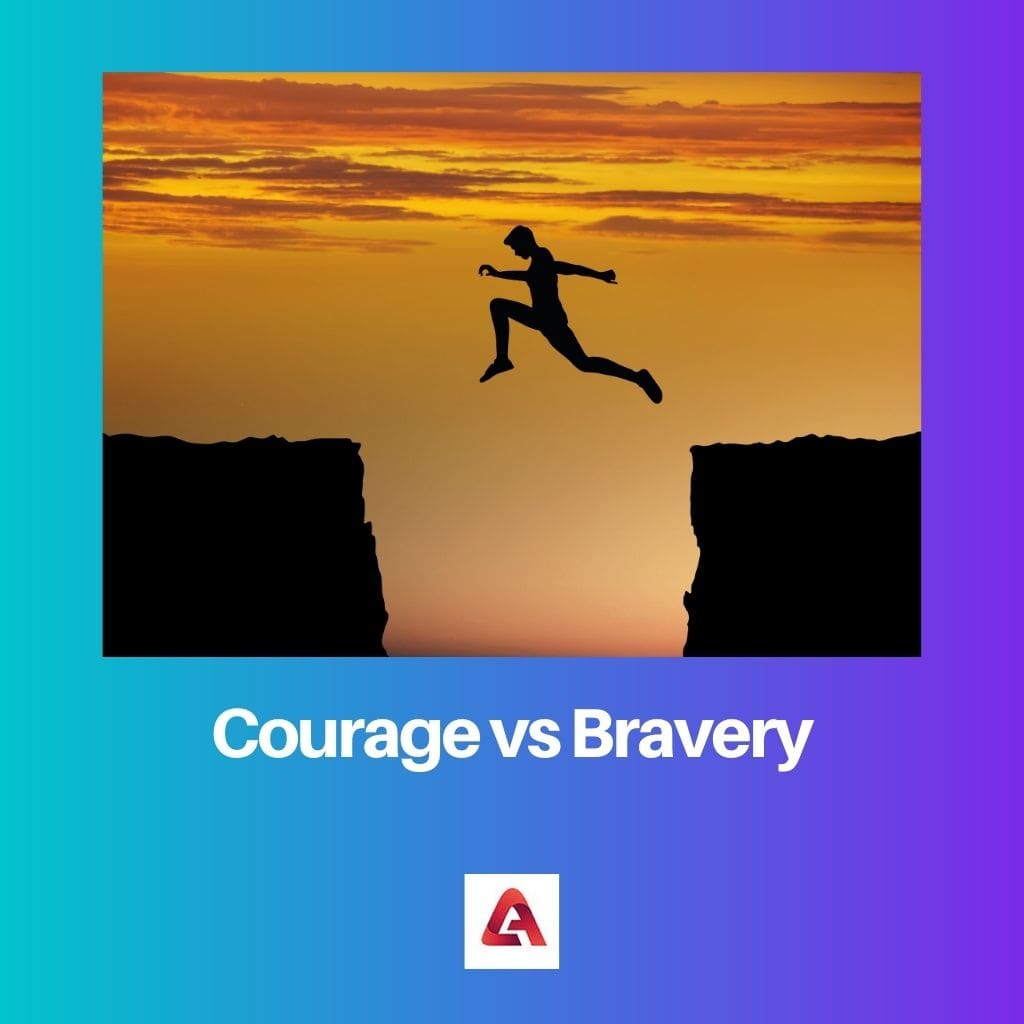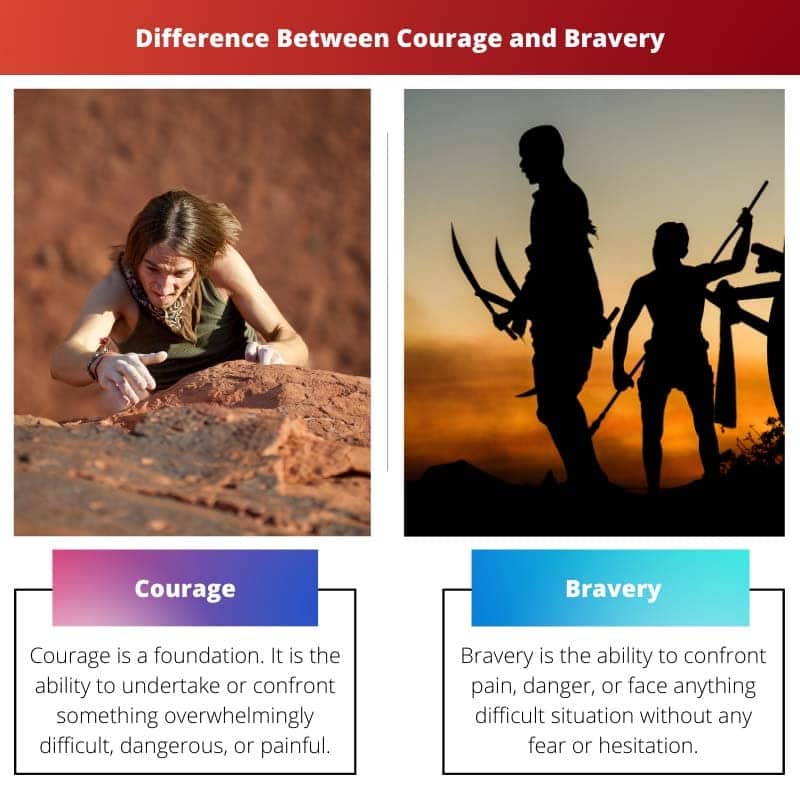Bravery and courage are two intertwined concepts. They are two sides of a similar coin. Both these factors are not just terms that can be used in huge instances, but they can also be mentioned in case of small reference.
Both of these factors are necessary for the smooth functioning of the human world today. As these two concepts are partially linked, people tend to confuse them, but they are two very separate ideologies.
Key Takeaways
- Courage is the ability to face fear or adversity with resolve, regardless of the outcome; bravery is the willingness to confront danger or difficulty, even when afraid or uncertain.
- Courage involves taking a principled stand or overcoming inner obstacles, such as self-doubt or anxiety; bravery involves facing external threats or challenges, such as physical danger or personal risk.
- Courage is associated with moral or ethical virtues, such as honesty, integrity, or justice; bravery is associated with physical or external feats of heroism.
Courage vs. Bravery
The difference between courage and bravery is that courage does not, in every instance, include any danger or threat. Bravery, however, includes a threat to one’s well-being or any risk of danger. Courage is required to overcome an act of bravery.

Courage is the ability to face a difficult situation. Courage is what leads one toward taking action.
On the other hand, bravery is the action that has, in turn, been taken after overcoming the fear. Bravery defines the physical action of courage, whereas courage is the mental strength that convinces the person to perform a difficult task.
Comparison Table
| Parameter of Comparison | Courage | Bravery |
|---|---|---|
| Danger | In the case of courage, there is not always a danger | Involves dangerous situation |
| Primary | Comes first | After one gains courage commits an act of bravery |
| Characteristics | Mental or moral strength | Includes mental, physical, and psychological strength |
| Overcame Cause | Love, passion, and compassion | It takes place without any cause |
| Example | Admitting to a lie | Risking one’s life to save others |
What is Courage?
Courage is a foundation. It is the ability to undertake or confront something overwhelmingly difficult, dangerous, or painful. It is a choice that one overcomes.
Courage is deciding to take a particular action regardless of it being a personal struggle and dealing with it.
Bravery is a state of mind that is driven by a cause. It is driven by something that makes the person feel worth standing up and fighting for it. This cause is what makes it happen.
The true process of courage is not about overcoming the obstacle but instead, the choice to fight for it regardless and take a chance.
Courage is always linked with a compulsion to act on something by choice or force. The reason for concern is a concern, compassion, devotion, passion, or love.
There are 6 attributes of courage: feeling fear yet choosing to act, preserving in the face of adversity, standing up for what is right, extending the horizon and letting go of the familiar, and facing suffering with the dignity of faith.

What is Bravery?
Bravery is the outcome of being brave or displaying courage. Bravery is confronting pain and danger or facing anything difficult without fear or hesitation.
It is an action that a person has overcome. It is strength in a person that helps them overcome the act. Regardless of the matter being big or small, when a person faces any fear, it is an act of bravery.
Most of the time, a risk of danger or a threat to a person’s well-being is linked with displaying bravery. Bravery is also in saying out loud what one thinks of.
Acknowledging our fear, dissecting it, and facing it helps in overcoming fear and committing to an act of bravery.
Being brave can also involve performing certain tasks in our day-to-day life, such as disappointing others and taking a stand for oneself, saying no and honoring one’s choices, and speaking the truth regardless of the outcome.
Bravery as a concept can be applied to a larger number of instances, such as physical, mental, and psychological.

Main Differences Between Courage and Bravery
- In courage, there is not always danger involved. Danger might or might not be there. But in the case of bravery, danger or a threat to the person’s well-being is involved.
- Courage comes to a person first, and then it is accompanied by an act of bravery.
- Courage involves mental and moral strength, a majorly inner feeling, whereas danger involves mental, physical, and psychological strength as the action has to be done.
- In the case of courage, there is fear and hesitation within the person. In the case of bravery, the person has already overcome the fear, and the act has been committed.
- The reasons behind a person being courageous are concern, compassion, devotion, passion, or love. However, an act of bravery happens without any proper cause

- https://psycnet.apa.org/record/1989-98548-000
- https://books.google.com/books?hl=en&lr=&id=WEz3kAHzMrEC&oi=fnd&pg=PR7&dq=courage&ots=Y5z7NbG9kW&sig=ggDCFC5eDPYetzcobl2SAmKhZ9Y
- https://books.google.com/books?hl=en&lr=&id=nLh0DQAAQBAJ&oi=fnd&pg=PT12&dq=bravery&ots=Xg3KPoAy41&sig=okJDBPd8yWAhK_N1MNvajWsvbuY

The article showcases a sarcastic take on the distinctions between courage and bravery, offering a refreshing perspective.
The article’s satirical tone makes it an entertaining yet enlightening piece on courage and bravery.
Absolutely, the satirical nuances in the article add a layer of depth to our perception of courage and bravery.
The article presents an ironic distinction between courage and bravery, signifying the subtleties of their meanings.
Agreed, the article’s subtle approach to defining courage and bravery adds depth to our understanding.
I appreciate the ironic undertones in the article, which prompt contemplation of the complexities inherent in courage and bravery.
This article provides a thorough explanation of the distinction between courage and bravery. It is informative and insightful.
I agree, this article offers a comprehensive understanding of the concepts of courage and bravery.
An excellent analysis of the differences between courage and bravery. It sheds light on their nuanced definitions.
The distinctions between courage and bravery are clearly outlined in this article. It’s a valuable read.
I concur, the clarity and depth of the explanations make this article a noteworthy piece.
The article offers a profound insight into the attributes of courage and bravery, shedding light on their significance.
The comparison table is especially useful in highlighting the disparities between courage and bravery. Well done.
Absolutely, the direct comparison makes it easier to grasp the contrast between these two concepts.
A comical yet insightful portrayal of the concepts of courage and bravery. An engaging read.
The article provides a compelling argument distinguishing between courage and bravery. It’s intellectually stimulating.
A thought-provoking discussion on the differences between courage and bravery. It delves deep into their essence.
This article provides a captivating analysis of courage and bravery, offering valuable perspectives.
Absolutely, the detailed exploration of the characteristics of courage and bravery is commendable.